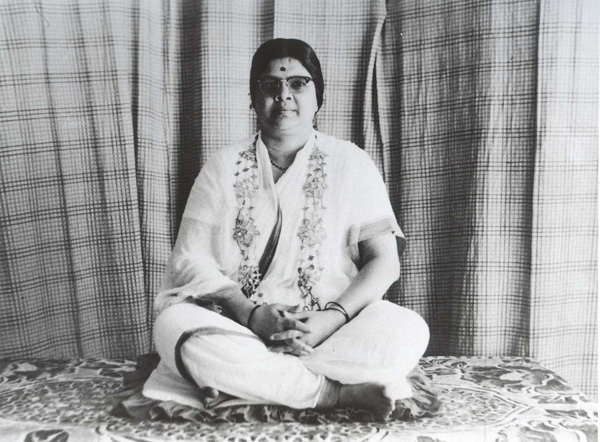 The
advent of Divinity as the world-preceptor heralds an
era of awakening in the social, moral and spiritual
spheres of human activity. Whereas the savants uphold
learning and the saints come to sing the glory of God,
the Divine assumes form and a personality to establish
dharma on earth. The life and teaching of the Divine
Personality is a vindication of the moral law. The
advent of Divinity as the world-preceptor heralds an
era of awakening in the social, moral and spiritual
spheres of human activity. Whereas the savants uphold
learning and the saints come to sing the glory of God,
the Divine assumes form and a personality to establish
dharma on earth. The life and teaching of the Divine
Personality is a vindication of the moral law.
Rama Sakti Mission is a movement based and build on
the highest ethics and spiritual philosophy of Divine
Mother. The light, the guide, the source of inspiration
and the power of sustenance for the Mission is Divine
Mother's grace and personality.
As a part of Mother's divine dispensation, the Mission
in its purely spiritual sense, has a history of growth
and development stretching over a period of more than
seven decades. In this sense, the Mission has been unfolding
itself stage by stage as a movement of spiritual force
initiated by Divine Sankalpa. Ever since Divine Mother
started guiding the disciples and devotees who flocked
to Her at Her home in Tellicherry, this movement too
has emerged as a unifying force.
In Mother's ministry, home occupies the pivotal position
of spiritual significance. The teaching which She imparts
and the system of yoga She has evolved, revolve round
the theme that perfection is possible of attainment
in home. In a world torn with strifes and conflicts,
at a time when social order itself is crumbling under
the weight of evil and moral anarchy, the movement initiated
by Divine Mother breathes into the body of the society
a rejuvenating moral force and spiritual energy.
Tracing the historical trend of our movement, it is
but appropriate to say that the fundamental units of
our Mission are therefore the homes where the Mother's
disciples and devotees live and function. The governing
ideals of our Movement also form part of the codes of
conduct for individuals functioning in home and society.
In this Dispensation of Divine Mother, the individual,
the home and the public institution are brought into
the frame work of a common discipline. The Movement
as the organized body, has in the beginning, private
home as its venue of activity before it began, spreading,
into greater spheres'.
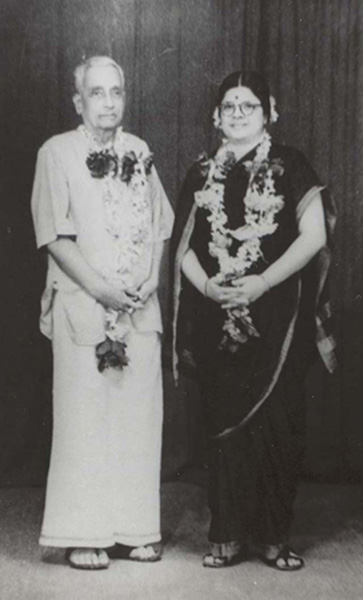 Uniting
individuals into a common fraternity and bringing homes
into a regime of Divine Mother's healthy spiritual discipline,
emerged the adhyatimic units popularly called as "Mandalies".
Under Mother's aegis and inspiration, several such Mandalies,
the centres of spiritual activity, sprang up all over
the country and even abroad and we have today a vast
and co-ordinated network of spiritual units steadily
expanding with a membership already running into thousands.
These Mandalies provide the forum for hundreds of seekers
and sadhakas, irrespective of caste, creed or social
standing, to come together and assemble on a common
platform of an all-embracing spiritual ideal. They promote
a whole order of brotherhood, committed to a higher
way of life and working for personal spiritual progress
as well as the good of mankind. They are centres of
social harmony promoting the ancient culture of the
Rishis of this land. Uniting
individuals into a common fraternity and bringing homes
into a regime of Divine Mother's healthy spiritual discipline,
emerged the adhyatimic units popularly called as "Mandalies".
Under Mother's aegis and inspiration, several such Mandalies,
the centres of spiritual activity, sprang up all over
the country and even abroad and we have today a vast
and co-ordinated network of spiritual units steadily
expanding with a membership already running into thousands.
These Mandalies provide the forum for hundreds of seekers
and sadhakas, irrespective of caste, creed or social
standing, to come together and assemble on a common
platform of an all-embracing spiritual ideal. They promote
a whole order of brotherhood, committed to a higher
way of life and working for personal spiritual progress
as well as the good of mankind. They are centres of
social harmony promoting the ancient culture of the
Rishis of this land.
The divine urge and the motherly love prompted Mother
to move out of Her private home in Tellicherry disseminating
wisdom and propagating the divine gospels of higher
life. Shri. Bhagawan, Her consort, also used to travel
with Mother during such triumphal tours for many years
until he was advised to discontinue tours on medical
grounds. Where-ever Mother's Holy Feet trod, where-ever
Her voice was heard, a Mandali cropped up and the message
took deep root in the devotees' hearts. Mother's has
been an epoch making tour, the veritable 'digvijaya',
conquering human minds and directing lives into channels
of Truth and Righteousness.
Congregational bhajans, worship of Divine Mother, mass meditation, talks on spiritual topics and propagation
of Mother's message through sale of publications etc.,
are the main features of spiritual activity carried
on in the Mandalies. Thus the Mandali served as a spiritual
institution for many new seekers, showing the way to
the Presence of Divinity, Divine Mother Herself and
the life divine. Receiving spiritual guidance from Divine
Mother, these adhyatmic unit have been, since the past
many years, functioning systematically.
Thus, it is correct to say that the first appearance
of the Mission in a properly organized manner was in
the form of Mandalies. These units scattered in various
parts of the country were actually the limbs of the
unseen spiritual personality of the Mission. The Mandalies
worked harmoniously as independent units. Though there
was no central organization to supervise their activities,
perfect emotional integration prevailed among them,
purely due to the power of Divine Mother's love and
the idealism supplied by Her Teaching. A common devotion
and loyalty to Divine Mother served as the unifying
link. Though some of these big centres situated in the
principle cities, were registered bodies, many others
functioned as groups recognized by the fraternity.
Devotees of Divine Mother have a common identity and
are above sectarian loyalties based on language, province,
caste and community. Love has bound them into a single,
strong and well-knit community. Such miraculous unification
of hearts, hard to be found in the modern world, is
indeed a wonder of Mother's Divine personality and spiritual
teaching. Though customs of communities are respected,
though regional festivals and religious customs are
honoured, Mother's devotees are one in their spiritual
brotherhood, in their higher allegiance to Mother and
the Mission, and also in their higher mode of life.
Their outlook of life is same. The distinctions as high
and low do not exist in thought and conduct. The diversities
are there in mental temperaments, in ways of dress,
in language, but they are superficial and are encompassed
by a deeper unity.
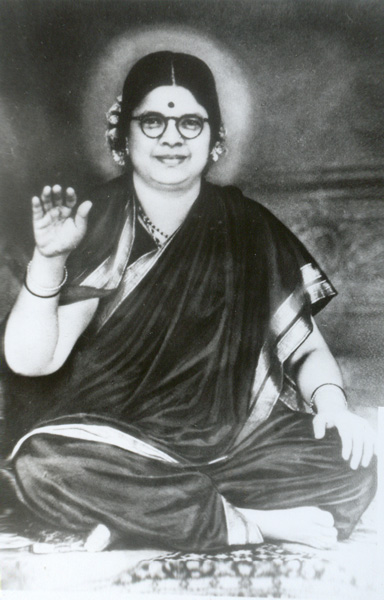 As
the membership and the Mandalies grew, a need was felt
for a unification into a central Organization. After
having prepared the ground through emotional integration,
and inspired by Divine Mother's call to a humanitarian
religion of love, unity and understanding, these adhyatmic
mandalies formed themselves into a Central Body under
the name 'Ram? ?akti Mission' as an Organization registered
under Societies Act on October 18, 1965, with Mangalore,
Divine Mother's place of birth as its Head Quarters. As
the membership and the Mandalies grew, a need was felt
for a unification into a central Organization. After
having prepared the ground through emotional integration,
and inspired by Divine Mother's call to a humanitarian
religion of love, unity and understanding, these adhyatmic
mandalies formed themselves into a Central Body under
the name 'Ram? ?akti Mission' as an Organization registered
under Societies Act on October 18, 1965, with Mangalore,
Divine Mother's place of birth as its Head Quarters.
The distinguishing aspect of our Movement is that the
individual units, the Mandalies came into being first
and the unifying Centre emerged afterwards. As a tiny
seed grows into a gigantic tree, so too, is growing
into universal dimension. Dedicated to the propagation
of Divine Mother's Teaching and thereby to the social
and spiritual advancement of mankind, the Mission accommodates
within its planned programme of activity, not only the
scope of spiritual progress of the individuals but also
the scheme for uplift of social conditions.
The activities of the Mission are guided by a sense
of realism and practical outlook on life. What the Mission
envisages is not an exclusive and isolated pursuit of
a personal religion, but the development of an all round
and integrated personality and the evolving of a free,
illumined, talented and dedicated community of men and
women, armed with practical efficiency, moral purity,
ethical excellence and spiritual consciousness. It is
this aspect of spirituality that attracts to the fold
of the Mission householders who constitute the backbone
of the nation.
The administration of the Mission's affairs conforms
to Mother's lofty ideals. This is an edifice founded
on spirituality. The concept of spiritual life, emerging
from Mother's Teaching and Her own illustrious personal
example of life is n ot a life of cloistered seclusion
cut off from the mainstream of human society, but of
a life of dynamism, a life of immense capacity to be
useful in service to fellowmen, a life of non-attachment,
a life that reconciles meditational pursuit and social
duties. The members of the Mission are mostly active
men of the world, whose outlook is spiritual but whose
sphere of activity is society.
The aspiration of the Mission is to reflect the will
of Divine Mother; the organizational activity of the
Mission through its own general and governing bodies
and the Branch units and affiliated groups, is to give
practical shape to Mother's teaching relating to a higher
and God-oriented life. From private homes to public
institutions the rhythm of a divine existence has to
be established.
Among the noble objects of the Mission are phased programmes
and plans for creative service, not only for the dissemination
of spiritual knowledge, but also for amelioration of
the social conditions. The poor, sick and the destitute
have to be taken care of through education, free medical
aid and spiritual ministration. The career of the younger
generation has to be moulded. Mother's divine gospels
have to be propagated and popularized through effective
and efficient publication machinery.
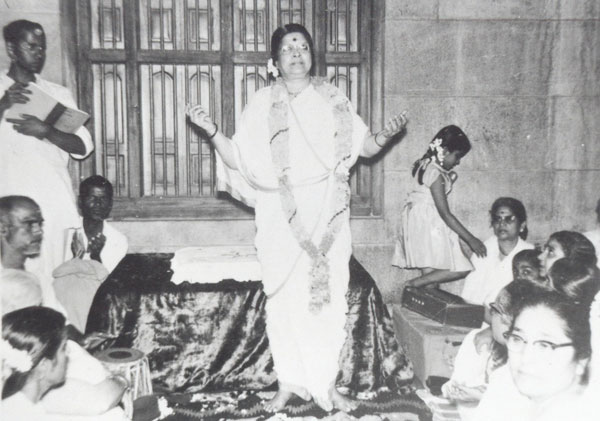 Though
the external and organized form of activity in a spirit
of service is the visible aspect of the Mission envisaged
in its Memorandum of Associations, the inner potential,
the nucleus of the Mission is truly spiritual in nature.
Service, to be an expression of disinterested love,
has to spring up form an integrated personality. Social
service becomes an empty slogan when name and fame and
personal glory become prime motivations. Service, in
true sense, is a loving communion with the fellow beings,
a communion with the social Self, a communion with one's
own deeper divinity finding expression in creative unfoldment
of personality. Therefore, man is more important than
his work. Work flowing from a selfish man brings no
benefit either to himself or to the society. Hence,
inward spiritual integrity receives primary consideration
in Mother's teaching. When one outgrows his little self,
the aroma of his Soul radiates. His actions become a
service. Taking this spiritual aspect into account,
the Mission is concentrating its energy, will and resources
in building up an ideal community of men and women dedicated
to the noblest idealism reflected in Mother's exhortations.
The developmental activities of the Mission have been
primarily guided by this objective in view. Though
the external and organized form of activity in a spirit
of service is the visible aspect of the Mission envisaged
in its Memorandum of Associations, the inner potential,
the nucleus of the Mission is truly spiritual in nature.
Service, to be an expression of disinterested love,
has to spring up form an integrated personality. Social
service becomes an empty slogan when name and fame and
personal glory become prime motivations. Service, in
true sense, is a loving communion with the fellow beings,
a communion with the social Self, a communion with one's
own deeper divinity finding expression in creative unfoldment
of personality. Therefore, man is more important than
his work. Work flowing from a selfish man brings no
benefit either to himself or to the society. Hence,
inward spiritual integrity receives primary consideration
in Mother's teaching. When one outgrows his little self,
the aroma of his Soul radiates. His actions become a
service. Taking this spiritual aspect into account,
the Mission is concentrating its energy, will and resources
in building up an ideal community of men and women dedicated
to the noblest idealism reflected in Mother's exhortations.
The developmental activities of the Mission have been
primarily guided by this objective in view.
Mission's record of progress during years has been
spectacular. In some of the Mission centers like Trivandrum,
Kayamkulam, Trichur, Mailapuram, Mercara, Bangalore
and Bombay, beautiful prayer Halls and Mandirs have
been constructed. In the shrines at Trivandrum, Kayamkulam
and Trichur, the 'Panchaloha Vigrahas' of Divine Mother
have been religiously installed by Divine Mother Herself.
In the Mandirs at Mercara and Thana, imposing marble
idols of Divine Mother have been installed by Divine Mother Sree Tara Devi, the President of the Mission and Divine
Mother's successor. Quite recently, Mandirs sprang up,
one at Ahmednagar, Maharashtra, and the other at Cannanore,
Kerala. In both these Mandirs, lovely Krishna Shila
(Black Stone) vigrahas of Divine Mother were installed
by Divine Mother Sree Tara Devi and the consecration ceremonies
connected with the same were solemnized with a series
of colorful religious programmes.
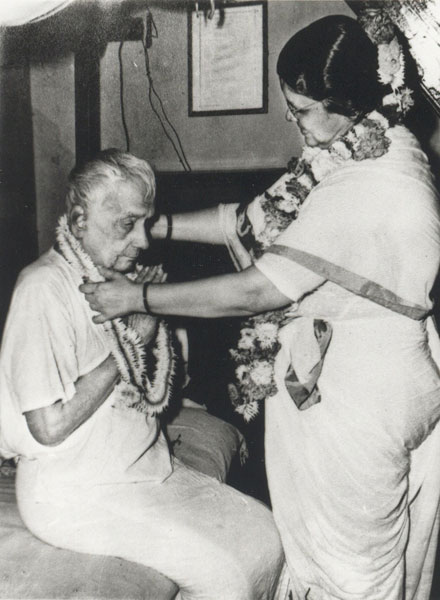 The
biggest Mandir dedicated to Devi Ramambika (Divine Mother)
came into being however at the Mission's Headquarters,
Shakti Nagar, in the year 1976. This Mandir is a combination
of two structures: one, a lovely and massive prayer
hall, Bhagawan Memorial, by name, with a seating capacity
of 1200, and dedicated to the hallowed memory of Sri.
Bhagawan (Sri. S. Krishna Bhagath), and the other, a
strong and powerful shrine dedicated to the worship
of Devi Ramambika. This impressive Temple was declared
open by Divine Mother Herself on 12th April 1976. The
installation of the beautiful Krishna Shila Vigraha
of Devi Ramambika, took place at the Hands of Divine Mother Sree Tara Devi in the immediate benedictive presence
of Divine Mother, since then, the Mandir has grown into
a powerful spiritual center. The shrine is full of presence,
chaitanya and glory of Divine Mother. The
biggest Mandir dedicated to Devi Ramambika (Divine Mother)
came into being however at the Mission's Headquarters,
Shakti Nagar, in the year 1976. This Mandir is a combination
of two structures: one, a lovely and massive prayer
hall, Bhagawan Memorial, by name, with a seating capacity
of 1200, and dedicated to the hallowed memory of Sri.
Bhagawan (Sri. S. Krishna Bhagath), and the other, a
strong and powerful shrine dedicated to the worship
of Devi Ramambika. This impressive Temple was declared
open by Divine Mother Herself on 12th April 1976. The
installation of the beautiful Krishna Shila Vigraha
of Devi Ramambika, took place at the Hands of Divine Mother Sree Tara Devi in the immediate benedictive presence
of Divine Mother, since then, the Mandir has grown into
a powerful spiritual center. The shrine is full of presence,
chaitanya and glory of Divine Mother.
These Shrines and prayer halls are not mere places
for worship. They have grown into potential spiritual
institutions where the Sadhakas in hundreds are engaged
in a collective quest. This is indeed a new experiment
in religious quest and has already started revealing
its inherent dynamism. Apart from fostering a feeling
of fraternity and fellowship and facilitating quicker
spiritual advancement to the individual sadhakas, these
institutions of spirituality are making a tremendous
contribution towards creation of an egalitarian society.
Among the declared objectives of the Mission are (a)
to form a nucleus of the universal brotherhood of humanity
without distinction of race, creed, caste or sex; (b)
to enlighten the people on the principles of service
to humanity in a spirit of dedication to God as propounded
by Divine Mother; (c) to popularize the teachings of
Divine Mother; (d) to awaken human consciousness to
eternal values of Sanatana Dharma; (e) to serve humanity
by restoring domestic and community lives to the highest
concept of spiritual and moral perfection as emphasized
in the teachings of Divine Mother. Herein an ideal of
the highest form of spirituality reconciling the secular
and spiritual interests of life. In fact, in Mother's
concept of spirituality, there are no compartments like
worldly and spiritual. Spiritual outlook and spiritual
vision should dictate and inspire activity, in all spheres
of life. Mother's is a dynamic spirituality which is
kept aloft as a practical ideal to be realized even
by the busy householder.
One of the spectacular achievements of the Mission,
is the launching of its wing of humanitarian service,
extending free medical aid to the poor and down trodden.
Under this scheme, Ram? ?akti Mission Charitable Hospital
was inaugurated at Shakti Nagar premises by H. E. Shri
Govind Narain, the Governor of Karnataka, on 11th April,
1979. Built at a cost of Rs. 9.5 lakhs, this Hospital
project is a comprehensive Medical Complex, consisting
of male and female Examination chambers, Specialists
Chamber, E.C.G. Unit, Midwifery and Delivery Chamber
and a vast air-conditioned Operation Theatre, with preparatory
room and Post-operative Ward. To start with, the Hospital
has two General Wards one for men and the other for
women, each consisting of 14 beds for in-patients, and
a special Block consisting of 6 rooms as Special Ward.
The Complex also covers quarters for Resident Doctor
and Nurses, a common kitchen and Drug store.
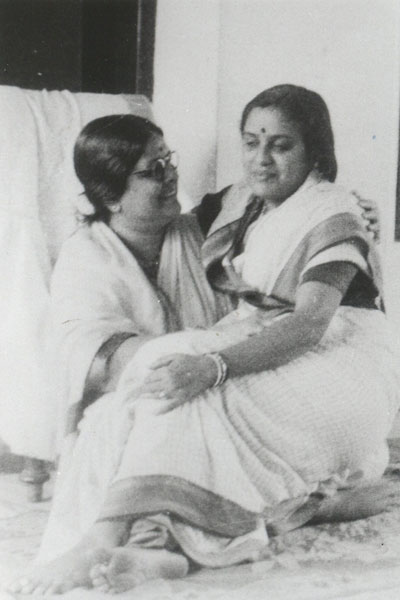 The
emergence of a well-equipped and competently manned
hospital with all component departments in such a rural
location has been hailed as a most welcome development.
This is a project which was very dear to Divine Mother
and She had watched the day-to-day growth of this structure
with kindly eyes and maternal love. In Mother's Dispensation,
service of fellow men receives the pride of place, leading
to a widening of sympathy and expansion of consciousness,
which are the hall marks of perfection. The
emergence of a well-equipped and competently manned
hospital with all component departments in such a rural
location has been hailed as a most welcome development.
This is a project which was very dear to Divine Mother
and She had watched the day-to-day growth of this structure
with kindly eyes and maternal love. In Mother's Dispensation,
service of fellow men receives the pride of place, leading
to a widening of sympathy and expansion of consciousness,
which are the hall marks of perfection.
The Mission, we believe, is still in its incipient
stage. With the achievements the Mission has already
to its credit, the vision of a bright future of immense
possibilities and attainments is with us. Time alone
can reveal the nature of the Divine plan to be worked
out through the executive agency of Divine, the Mission.
The affairs of the Mission, subject to rules and regulations
of the Mission and to Resolutions passed by the General
Body from time to time are being managed by the Governing
Body, the members to which are elected at the Annual
General Body Meeting from a panel of members approved
by the President. The office bearers are elected from
among the members of Governing Body. The Governing Body
periodically meets and decisions are taken by collective
deliberations. As founder members, representative members,
ordinary members, life members and non-resident members,
there are five categories of membership to the Mission.
With the grace of Divine Mother to guide, and a lofty
idealism to inspire, the Mission as a dynamic movement
of spiritual force is already making a great impact
on the contemporary society. It is our hope that the
Mission before long, will become an international moral
and spiritual movement helping mankind to realize the
grand idea voiced forth in the sacred Vedas - the idea
of a 'One World Community'. |







